Global Environment: Coca's Child Labor, Ethical Responsibilities
VerifiedAdded on 2022/10/07
|8
|1908
|29
Case Study
AI Summary
This case study examines the ethical responsibilities of Coca-Cola concerning child labor practices in its supply chain, specifically referencing a 2019 article from The Washington Post. The essay delves into the company's obligations, considering the UN Global Compact's principles, particularly Principle 5 regarding the abolition of child labor. It explores how Coca-Cola has breached this principle through its involvement, directly or indirectly, in child labor. The analysis applies business ethics and corporate social responsibility theories, including utilitarianism and integrative CSR, to evaluate the company's actions. The study recommends that the company should implement strict policies against hiring children under 15 and set up primary schools for the children of its workers. The essay concludes that Coca-Cola should integrate CSR and business ethics principles to enhance employee satisfaction and improve its global business practices. References from scholarly articles are also provided.
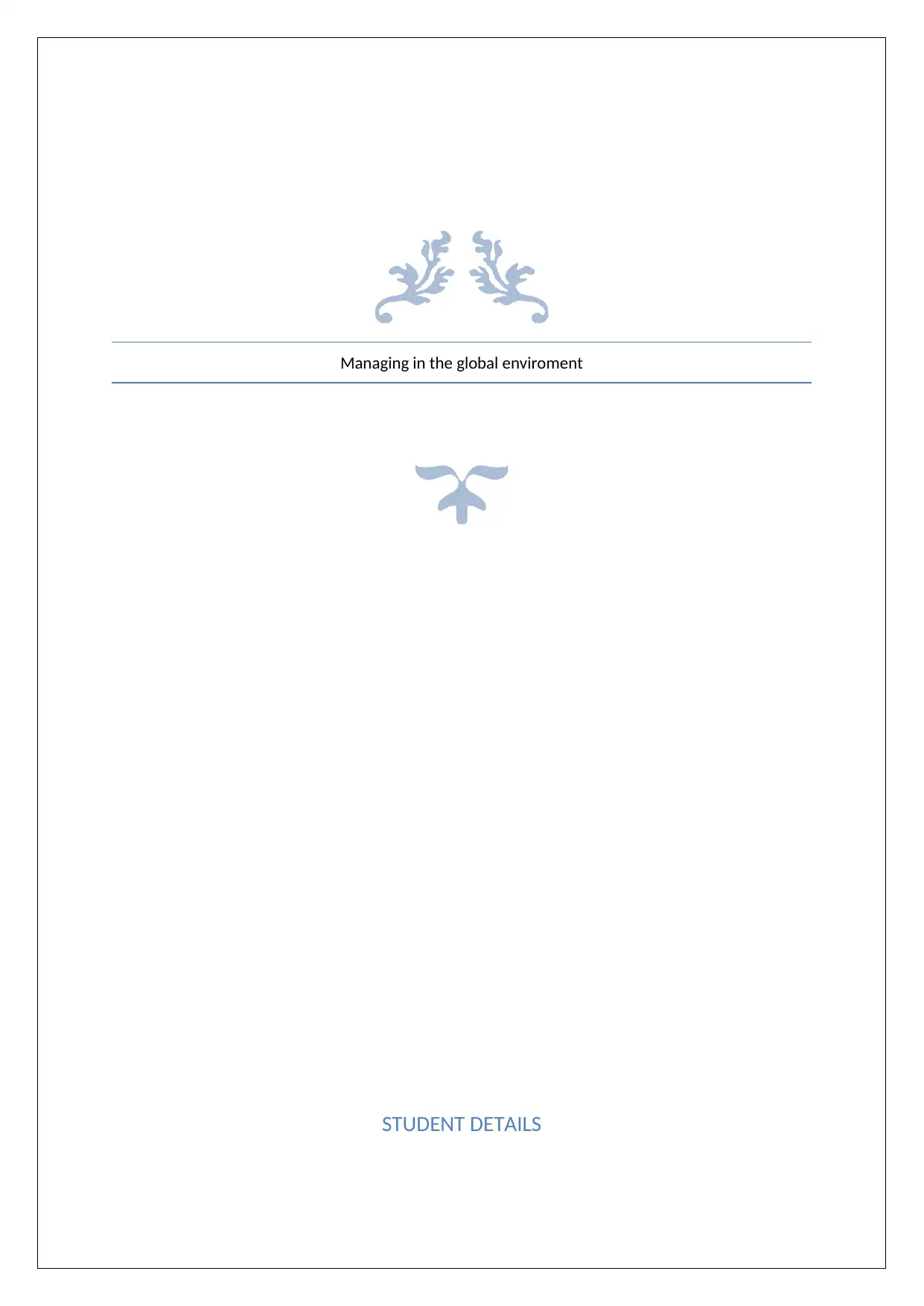
Managing in the global enviroment
STUDENT DETAILS
STUDENT DETAILS
Paraphrase This Document
Need a fresh take? Get an instant paraphrase of this document with our AI Paraphraser
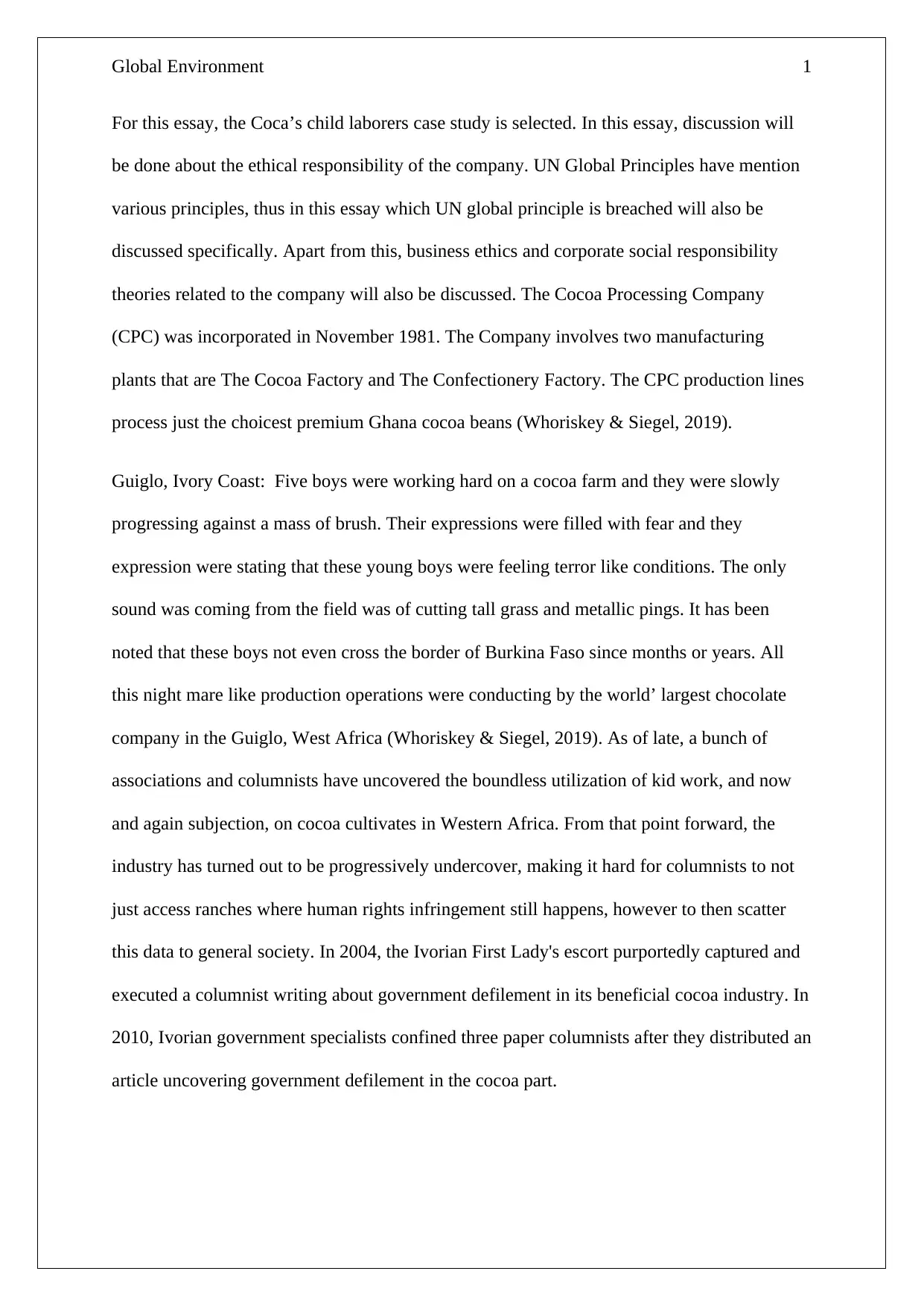
Global Environment 1
For this essay, the Coca’s child laborers case study is selected. In this essay, discussion will
be done about the ethical responsibility of the company. UN Global Principles have mention
various principles, thus in this essay which UN global principle is breached will also be
discussed specifically. Apart from this, business ethics and corporate social responsibility
theories related to the company will also be discussed. The Cocoa Processing Company
(CPC) was incorporated in November 1981. The Company involves two manufacturing
plants that are The Cocoa Factory and The Confectionery Factory. The CPC production lines
process just the choicest premium Ghana cocoa beans (Whoriskey & Siegel, 2019).
Guiglo, Ivory Coast: Five boys were working hard on a cocoa farm and they were slowly
progressing against a mass of brush. Their expressions were filled with fear and they
expression were stating that these young boys were feeling terror like conditions. The only
sound was coming from the field was of cutting tall grass and metallic pings. It has been
noted that these boys not even cross the border of Burkina Faso since months or years. All
this night mare like production operations were conducting by the world’ largest chocolate
company in the Guiglo, West Africa (Whoriskey & Siegel, 2019). As of late, a bunch of
associations and columnists have uncovered the boundless utilization of kid work, and now
and again subjection, on cocoa cultivates in Western Africa. From that point forward, the
industry has turned out to be progressively undercover, making it hard for columnists to not
just access ranches where human rights infringement still happens, however to then scatter
this data to general society. In 2004, the Ivorian First Lady's escort purportedly captured and
executed a columnist writing about government defilement in its beneficial cocoa industry. In
2010, Ivorian government specialists confined three paper columnists after they distributed an
article uncovering government defilement in the cocoa part.
For this essay, the Coca’s child laborers case study is selected. In this essay, discussion will
be done about the ethical responsibility of the company. UN Global Principles have mention
various principles, thus in this essay which UN global principle is breached will also be
discussed specifically. Apart from this, business ethics and corporate social responsibility
theories related to the company will also be discussed. The Cocoa Processing Company
(CPC) was incorporated in November 1981. The Company involves two manufacturing
plants that are The Cocoa Factory and The Confectionery Factory. The CPC production lines
process just the choicest premium Ghana cocoa beans (Whoriskey & Siegel, 2019).
Guiglo, Ivory Coast: Five boys were working hard on a cocoa farm and they were slowly
progressing against a mass of brush. Their expressions were filled with fear and they
expression were stating that these young boys were feeling terror like conditions. The only
sound was coming from the field was of cutting tall grass and metallic pings. It has been
noted that these boys not even cross the border of Burkina Faso since months or years. All
this night mare like production operations were conducting by the world’ largest chocolate
company in the Guiglo, West Africa (Whoriskey & Siegel, 2019). As of late, a bunch of
associations and columnists have uncovered the boundless utilization of kid work, and now
and again subjection, on cocoa cultivates in Western Africa. From that point forward, the
industry has turned out to be progressively undercover, making it hard for columnists to not
just access ranches where human rights infringement still happens, however to then scatter
this data to general society. In 2004, the Ivorian First Lady's escort purportedly captured and
executed a columnist writing about government defilement in its beneficial cocoa industry. In
2010, Ivorian government specialists confined three paper columnists after they distributed an
article uncovering government defilement in the cocoa part.
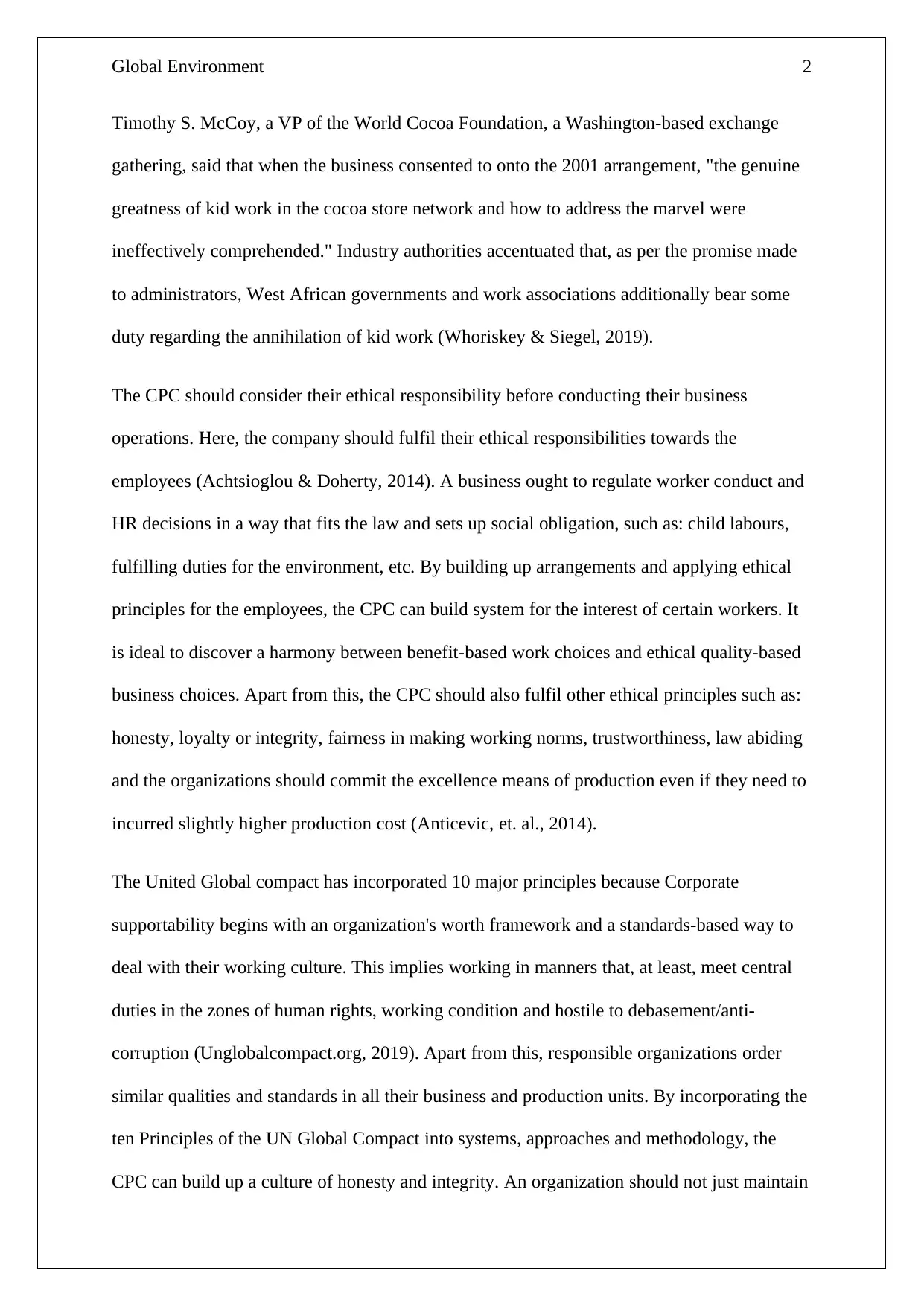
Global Environment 2
Timothy S. McCoy, a VP of the World Cocoa Foundation, a Washington-based exchange
gathering, said that when the business consented to onto the 2001 arrangement, "the genuine
greatness of kid work in the cocoa store network and how to address the marvel were
ineffectively comprehended." Industry authorities accentuated that, as per the promise made
to administrators, West African governments and work associations additionally bear some
duty regarding the annihilation of kid work (Whoriskey & Siegel, 2019).
The CPC should consider their ethical responsibility before conducting their business
operations. Here, the company should fulfil their ethical responsibilities towards the
employees (Achtsioglou & Doherty, 2014). A business ought to regulate worker conduct and
HR decisions in a way that fits the law and sets up social obligation, such as: child labours,
fulfilling duties for the environment, etc. By building up arrangements and applying ethical
principles for the employees, the CPC can build system for the interest of certain workers. It
is ideal to discover a harmony between benefit-based work choices and ethical quality-based
business choices. Apart from this, the CPC should also fulfil other ethical principles such as:
honesty, loyalty or integrity, fairness in making working norms, trustworthiness, law abiding
and the organizations should commit the excellence means of production even if they need to
incurred slightly higher production cost (Anticevic, et. al., 2014).
The United Global compact has incorporated 10 major principles because Corporate
supportability begins with an organization's worth framework and a standards-based way to
deal with their working culture. This implies working in manners that, at least, meet central
duties in the zones of human rights, working condition and hostile to debasement/anti-
corruption (Unglobalcompact.org, 2019). Apart from this, responsible organizations order
similar qualities and standards in all their business and production units. By incorporating the
ten Principles of the UN Global Compact into systems, approaches and methodology, the
CPC can build up a culture of honesty and integrity. An organization should not just maintain
Timothy S. McCoy, a VP of the World Cocoa Foundation, a Washington-based exchange
gathering, said that when the business consented to onto the 2001 arrangement, "the genuine
greatness of kid work in the cocoa store network and how to address the marvel were
ineffectively comprehended." Industry authorities accentuated that, as per the promise made
to administrators, West African governments and work associations additionally bear some
duty regarding the annihilation of kid work (Whoriskey & Siegel, 2019).
The CPC should consider their ethical responsibility before conducting their business
operations. Here, the company should fulfil their ethical responsibilities towards the
employees (Achtsioglou & Doherty, 2014). A business ought to regulate worker conduct and
HR decisions in a way that fits the law and sets up social obligation, such as: child labours,
fulfilling duties for the environment, etc. By building up arrangements and applying ethical
principles for the employees, the CPC can build system for the interest of certain workers. It
is ideal to discover a harmony between benefit-based work choices and ethical quality-based
business choices. Apart from this, the CPC should also fulfil other ethical principles such as:
honesty, loyalty or integrity, fairness in making working norms, trustworthiness, law abiding
and the organizations should commit the excellence means of production even if they need to
incurred slightly higher production cost (Anticevic, et. al., 2014).
The United Global compact has incorporated 10 major principles because Corporate
supportability begins with an organization's worth framework and a standards-based way to
deal with their working culture. This implies working in manners that, at least, meet central
duties in the zones of human rights, working condition and hostile to debasement/anti-
corruption (Unglobalcompact.org, 2019). Apart from this, responsible organizations order
similar qualities and standards in all their business and production units. By incorporating the
ten Principles of the UN Global Compact into systems, approaches and methodology, the
CPC can build up a culture of honesty and integrity. An organization should not just maintain
⊘ This is a preview!⊘
Do you want full access?
Subscribe today to unlock all pages.

Trusted by 1+ million students worldwide
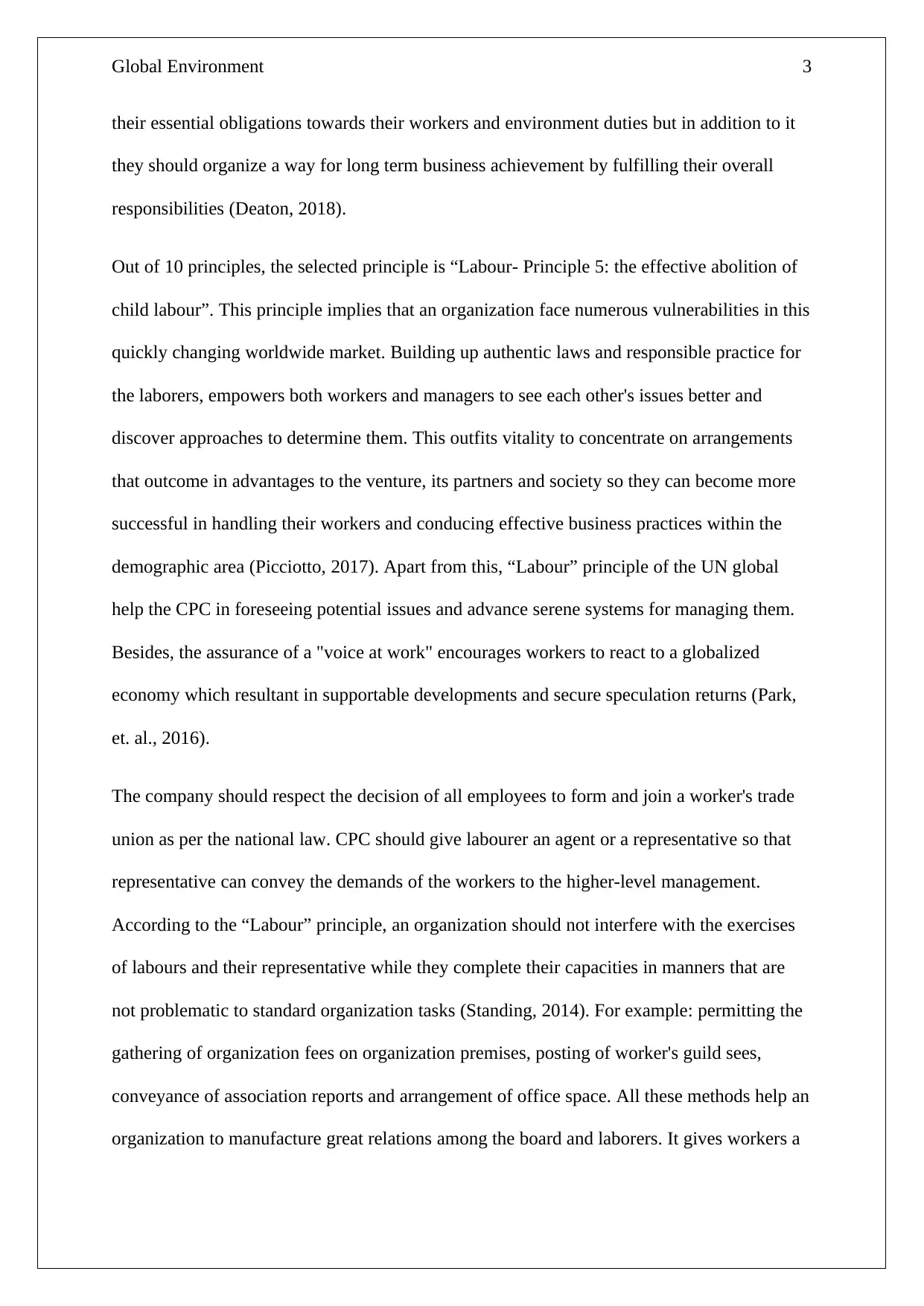
Global Environment 3
their essential obligations towards their workers and environment duties but in addition to it
they should organize a way for long term business achievement by fulfilling their overall
responsibilities (Deaton, 2018).
Out of 10 principles, the selected principle is “Labour- Principle 5: the effective abolition of
child labour”. This principle implies that an organization face numerous vulnerabilities in this
quickly changing worldwide market. Building up authentic laws and responsible practice for
the laborers, empowers both workers and managers to see each other's issues better and
discover approaches to determine them. This outfits vitality to concentrate on arrangements
that outcome in advantages to the venture, its partners and society so they can become more
successful in handling their workers and conducing effective business practices within the
demographic area (Picciotto, 2017). Apart from this, “Labour” principle of the UN global
help the CPC in foreseeing potential issues and advance serene systems for managing them.
Besides, the assurance of a "voice at work" encourages workers to react to a globalized
economy which resultant in supportable developments and secure speculation returns (Park,
et. al., 2016).
The company should respect the decision of all employees to form and join a worker's trade
union as per the national law. CPC should give labourer an agent or a representative so that
representative can convey the demands of the workers to the higher-level management.
According to the “Labour” principle, an organization should not interfere with the exercises
of labours and their representative while they complete their capacities in manners that are
not problematic to standard organization tasks (Standing, 2014). For example: permitting the
gathering of organization fees on organization premises, posting of worker's guild sees,
conveyance of association reports and arrangement of office space. All these methods help an
organization to manufacture great relations among the board and laborers. It gives workers a
their essential obligations towards their workers and environment duties but in addition to it
they should organize a way for long term business achievement by fulfilling their overall
responsibilities (Deaton, 2018).
Out of 10 principles, the selected principle is “Labour- Principle 5: the effective abolition of
child labour”. This principle implies that an organization face numerous vulnerabilities in this
quickly changing worldwide market. Building up authentic laws and responsible practice for
the laborers, empowers both workers and managers to see each other's issues better and
discover approaches to determine them. This outfits vitality to concentrate on arrangements
that outcome in advantages to the venture, its partners and society so they can become more
successful in handling their workers and conducing effective business practices within the
demographic area (Picciotto, 2017). Apart from this, “Labour” principle of the UN global
help the CPC in foreseeing potential issues and advance serene systems for managing them.
Besides, the assurance of a "voice at work" encourages workers to react to a globalized
economy which resultant in supportable developments and secure speculation returns (Park,
et. al., 2016).
The company should respect the decision of all employees to form and join a worker's trade
union as per the national law. CPC should give labourer an agent or a representative so that
representative can convey the demands of the workers to the higher-level management.
According to the “Labour” principle, an organization should not interfere with the exercises
of labours and their representative while they complete their capacities in manners that are
not problematic to standard organization tasks (Standing, 2014). For example: permitting the
gathering of organization fees on organization premises, posting of worker's guild sees,
conveyance of association reports and arrangement of office space. All these methods help an
organization to manufacture great relations among the board and laborers. It gives workers a
Paraphrase This Document
Need a fresh take? Get an instant paraphrase of this document with our AI Paraphraser
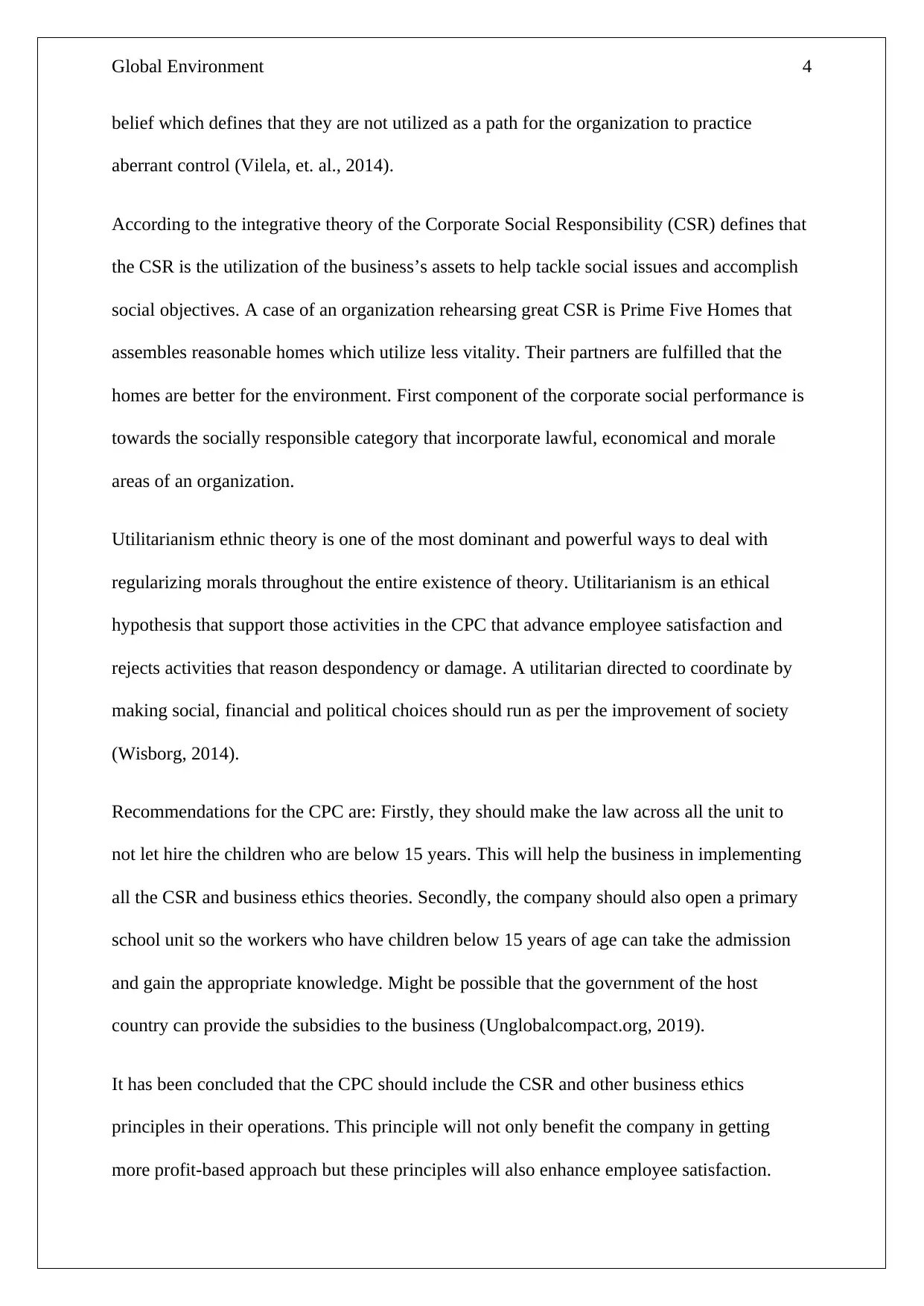
Global Environment 4
belief which defines that they are not utilized as a path for the organization to practice
aberrant control (Vilela, et. al., 2014).
According to the integrative theory of the Corporate Social Responsibility (CSR) defines that
the CSR is the utilization of the business’s assets to help tackle social issues and accomplish
social objectives. A case of an organization rehearsing great CSR is Prime Five Homes that
assembles reasonable homes which utilize less vitality. Their partners are fulfilled that the
homes are better for the environment. First component of the corporate social performance is
towards the socially responsible category that incorporate lawful, economical and morale
areas of an organization.
Utilitarianism ethnic theory is one of the most dominant and powerful ways to deal with
regularizing morals throughout the entire existence of theory. Utilitarianism is an ethical
hypothesis that support those activities in the CPC that advance employee satisfaction and
rejects activities that reason despondency or damage. A utilitarian directed to coordinate by
making social, financial and political choices should run as per the improvement of society
(Wisborg, 2014).
Recommendations for the CPC are: Firstly, they should make the law across all the unit to
not let hire the children who are below 15 years. This will help the business in implementing
all the CSR and business ethics theories. Secondly, the company should also open a primary
school unit so the workers who have children below 15 years of age can take the admission
and gain the appropriate knowledge. Might be possible that the government of the host
country can provide the subsidies to the business (Unglobalcompact.org, 2019).
It has been concluded that the CPC should include the CSR and other business ethics
principles in their operations. This principle will not only benefit the company in getting
more profit-based approach but these principles will also enhance employee satisfaction.
belief which defines that they are not utilized as a path for the organization to practice
aberrant control (Vilela, et. al., 2014).
According to the integrative theory of the Corporate Social Responsibility (CSR) defines that
the CSR is the utilization of the business’s assets to help tackle social issues and accomplish
social objectives. A case of an organization rehearsing great CSR is Prime Five Homes that
assembles reasonable homes which utilize less vitality. Their partners are fulfilled that the
homes are better for the environment. First component of the corporate social performance is
towards the socially responsible category that incorporate lawful, economical and morale
areas of an organization.
Utilitarianism ethnic theory is one of the most dominant and powerful ways to deal with
regularizing morals throughout the entire existence of theory. Utilitarianism is an ethical
hypothesis that support those activities in the CPC that advance employee satisfaction and
rejects activities that reason despondency or damage. A utilitarian directed to coordinate by
making social, financial and political choices should run as per the improvement of society
(Wisborg, 2014).
Recommendations for the CPC are: Firstly, they should make the law across all the unit to
not let hire the children who are below 15 years. This will help the business in implementing
all the CSR and business ethics theories. Secondly, the company should also open a primary
school unit so the workers who have children below 15 years of age can take the admission
and gain the appropriate knowledge. Might be possible that the government of the host
country can provide the subsidies to the business (Unglobalcompact.org, 2019).
It has been concluded that the CPC should include the CSR and other business ethics
principles in their operations. This principle will not only benefit the company in getting
more profit-based approach but these principles will also enhance employee satisfaction.
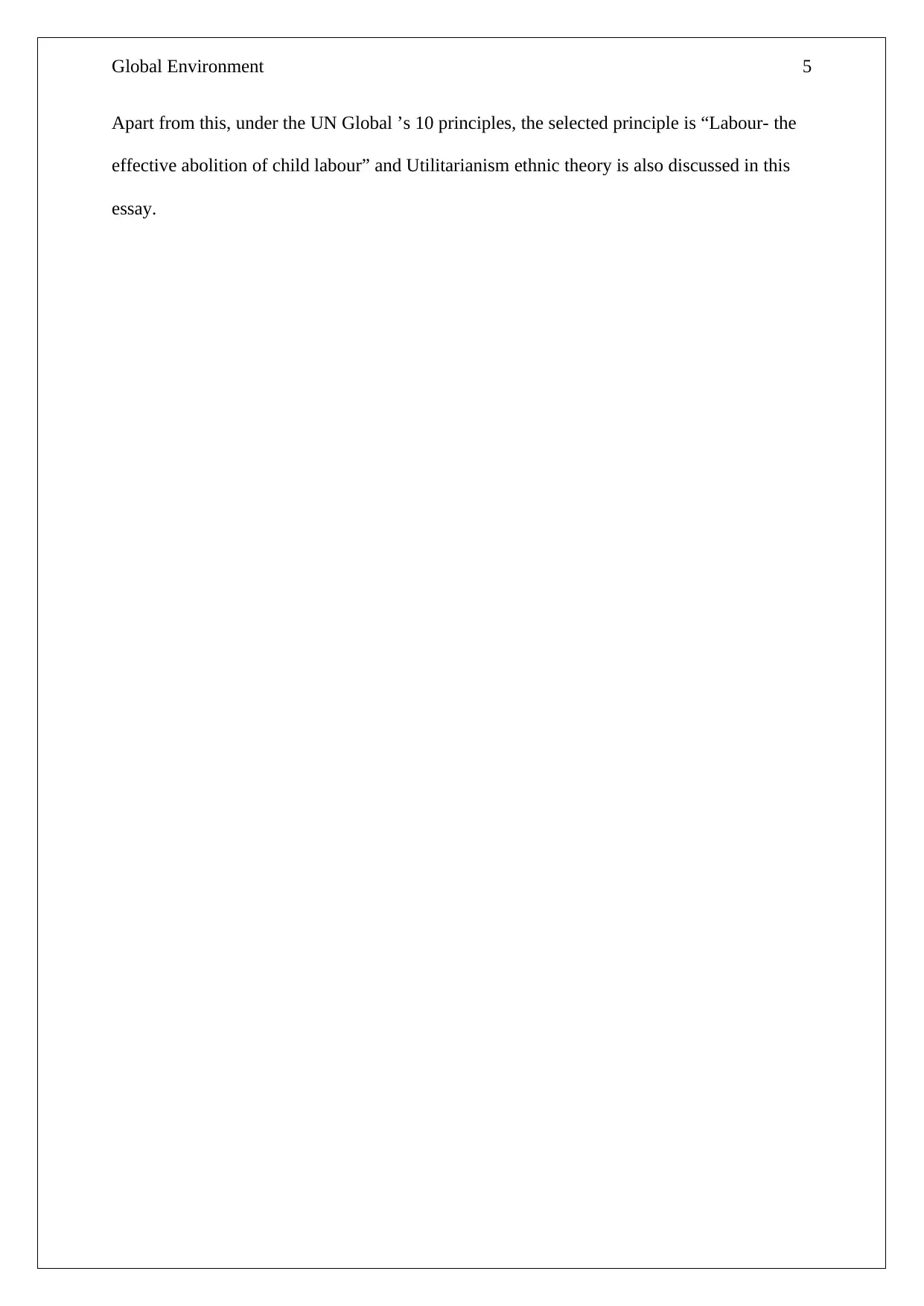
Global Environment 5
Apart from this, under the UN Global ’s 10 principles, the selected principle is “Labour- the
effective abolition of child labour” and Utilitarianism ethnic theory is also discussed in this
essay.
Apart from this, under the UN Global ’s 10 principles, the selected principle is “Labour- the
effective abolition of child labour” and Utilitarianism ethnic theory is also discussed in this
essay.
⊘ This is a preview!⊘
Do you want full access?
Subscribe today to unlock all pages.

Trusted by 1+ million students worldwide
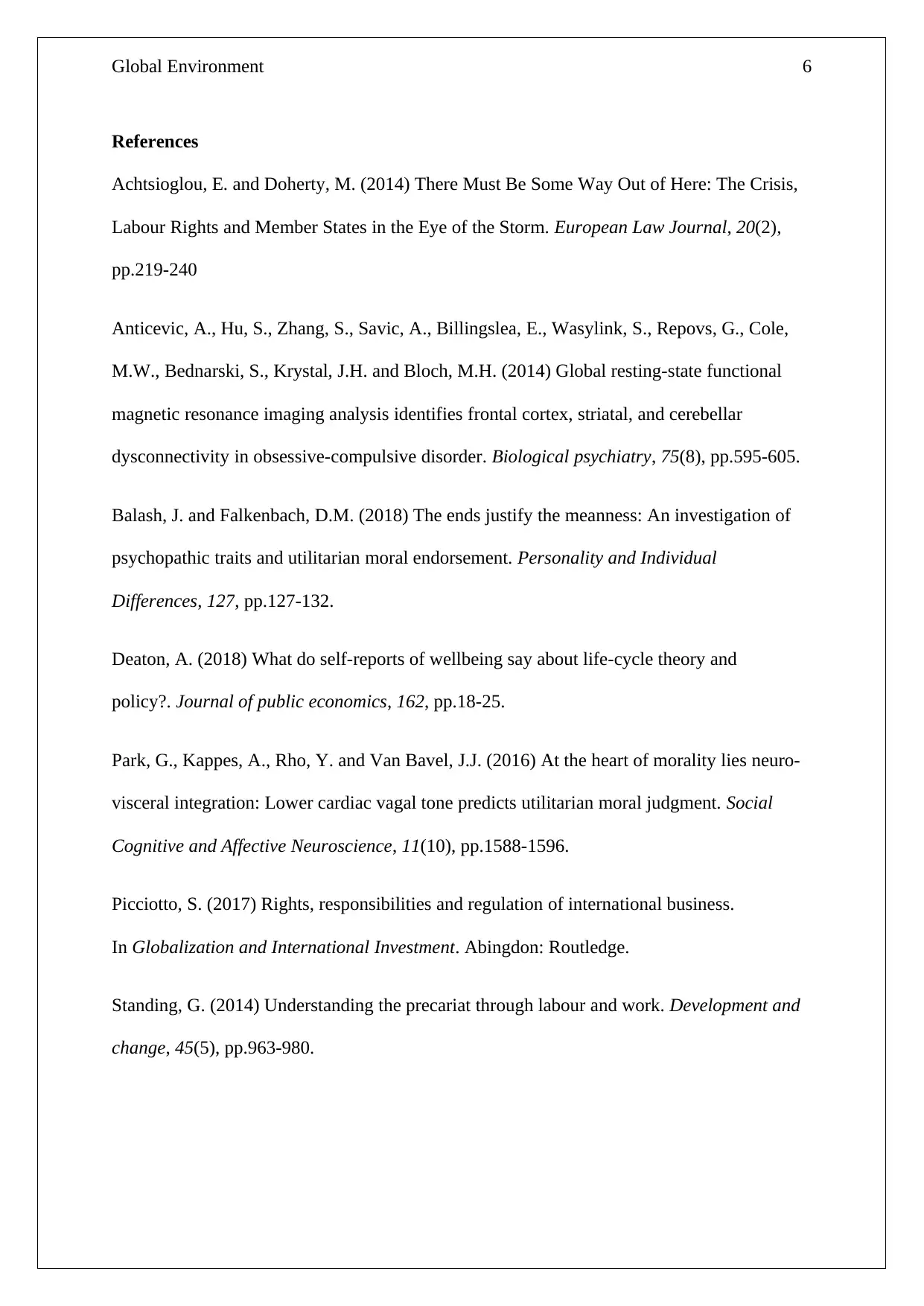
Global Environment 6
References
Achtsioglou, E. and Doherty, M. (2014) There Must Be Some Way Out of Here: The Crisis,
Labour Rights and Member States in the Eye of the Storm. European Law Journal, 20(2),
pp.219-240
Anticevic, A., Hu, S., Zhang, S., Savic, A., Billingslea, E., Wasylink, S., Repovs, G., Cole,
M.W., Bednarski, S., Krystal, J.H. and Bloch, M.H. (2014) Global resting-state functional
magnetic resonance imaging analysis identifies frontal cortex, striatal, and cerebellar
dysconnectivity in obsessive-compulsive disorder. Biological psychiatry, 75(8), pp.595-605.
Balash, J. and Falkenbach, D.M. (2018) The ends justify the meanness: An investigation of
psychopathic traits and utilitarian moral endorsement. Personality and Individual
Differences, 127, pp.127-132.
Deaton, A. (2018) What do self-reports of wellbeing say about life-cycle theory and
policy?. Journal of public economics, 162, pp.18-25.
Park, G., Kappes, A., Rho, Y. and Van Bavel, J.J. (2016) At the heart of morality lies neuro-
visceral integration: Lower cardiac vagal tone predicts utilitarian moral judgment. Social
Cognitive and Affective Neuroscience, 11(10), pp.1588-1596.
Picciotto, S. (2017) Rights, responsibilities and regulation of international business.
In Globalization and International Investment. Abingdon: Routledge.
Standing, G. (2014) Understanding the precariat through labour and work. Development and
change, 45(5), pp.963-980.
References
Achtsioglou, E. and Doherty, M. (2014) There Must Be Some Way Out of Here: The Crisis,
Labour Rights and Member States in the Eye of the Storm. European Law Journal, 20(2),
pp.219-240
Anticevic, A., Hu, S., Zhang, S., Savic, A., Billingslea, E., Wasylink, S., Repovs, G., Cole,
M.W., Bednarski, S., Krystal, J.H. and Bloch, M.H. (2014) Global resting-state functional
magnetic resonance imaging analysis identifies frontal cortex, striatal, and cerebellar
dysconnectivity in obsessive-compulsive disorder. Biological psychiatry, 75(8), pp.595-605.
Balash, J. and Falkenbach, D.M. (2018) The ends justify the meanness: An investigation of
psychopathic traits and utilitarian moral endorsement. Personality and Individual
Differences, 127, pp.127-132.
Deaton, A. (2018) What do self-reports of wellbeing say about life-cycle theory and
policy?. Journal of public economics, 162, pp.18-25.
Park, G., Kappes, A., Rho, Y. and Van Bavel, J.J. (2016) At the heart of morality lies neuro-
visceral integration: Lower cardiac vagal tone predicts utilitarian moral judgment. Social
Cognitive and Affective Neuroscience, 11(10), pp.1588-1596.
Picciotto, S. (2017) Rights, responsibilities and regulation of international business.
In Globalization and International Investment. Abingdon: Routledge.
Standing, G. (2014) Understanding the precariat through labour and work. Development and
change, 45(5), pp.963-980.
Paraphrase This Document
Need a fresh take? Get an instant paraphrase of this document with our AI Paraphraser
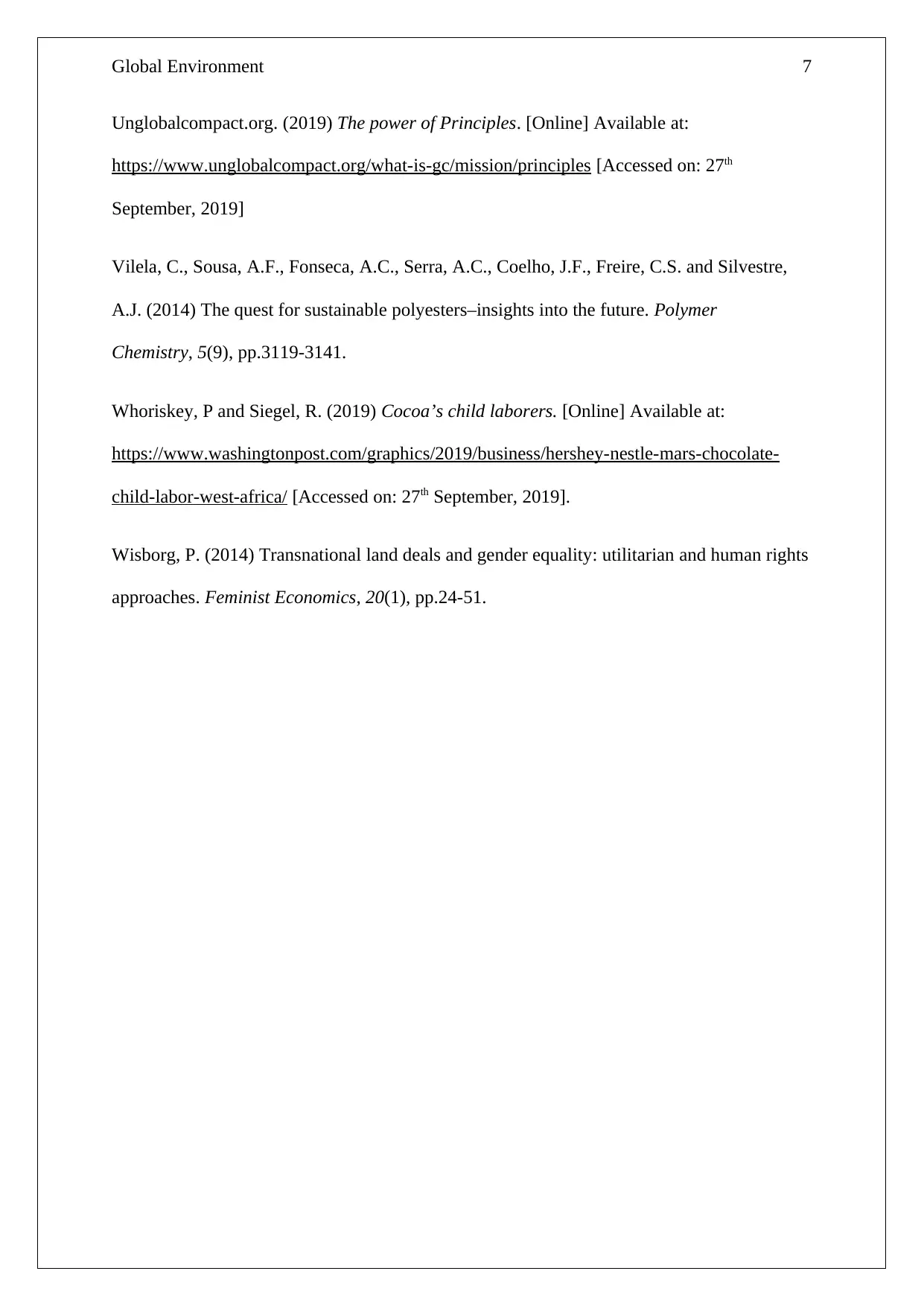
Global Environment 7
Unglobalcompact.org. (2019) The power of Principles. [Online] Available at:
https://www.unglobalcompact.org/what-is-gc/mission/principles [Accessed on: 27th
September, 2019]
Vilela, C., Sousa, A.F., Fonseca, A.C., Serra, A.C., Coelho, J.F., Freire, C.S. and Silvestre,
A.J. (2014) The quest for sustainable polyesters–insights into the future. Polymer
Chemistry, 5(9), pp.3119-3141.
Whoriskey, P and Siegel, R. (2019) Cocoa’s child laborers. [Online] Available at:
https://www.washingtonpost.com/graphics/2019/business/hershey-nestle-mars-chocolate-
child-labor-west-africa/ [Accessed on: 27th September, 2019].
Wisborg, P. (2014) Transnational land deals and gender equality: utilitarian and human rights
approaches. Feminist Economics, 20(1), pp.24-51.
Unglobalcompact.org. (2019) The power of Principles. [Online] Available at:
https://www.unglobalcompact.org/what-is-gc/mission/principles [Accessed on: 27th
September, 2019]
Vilela, C., Sousa, A.F., Fonseca, A.C., Serra, A.C., Coelho, J.F., Freire, C.S. and Silvestre,
A.J. (2014) The quest for sustainable polyesters–insights into the future. Polymer
Chemistry, 5(9), pp.3119-3141.
Whoriskey, P and Siegel, R. (2019) Cocoa’s child laborers. [Online] Available at:
https://www.washingtonpost.com/graphics/2019/business/hershey-nestle-mars-chocolate-
child-labor-west-africa/ [Accessed on: 27th September, 2019].
Wisborg, P. (2014) Transnational land deals and gender equality: utilitarian and human rights
approaches. Feminist Economics, 20(1), pp.24-51.
1 out of 8
Your All-in-One AI-Powered Toolkit for Academic Success.
+13062052269
info@desklib.com
Available 24*7 on WhatsApp / Email
![[object Object]](/_next/static/media/star-bottom.7253800d.svg)
Unlock your academic potential
Copyright © 2020–2025 A2Z Services. All Rights Reserved. Developed and managed by ZUCOL.